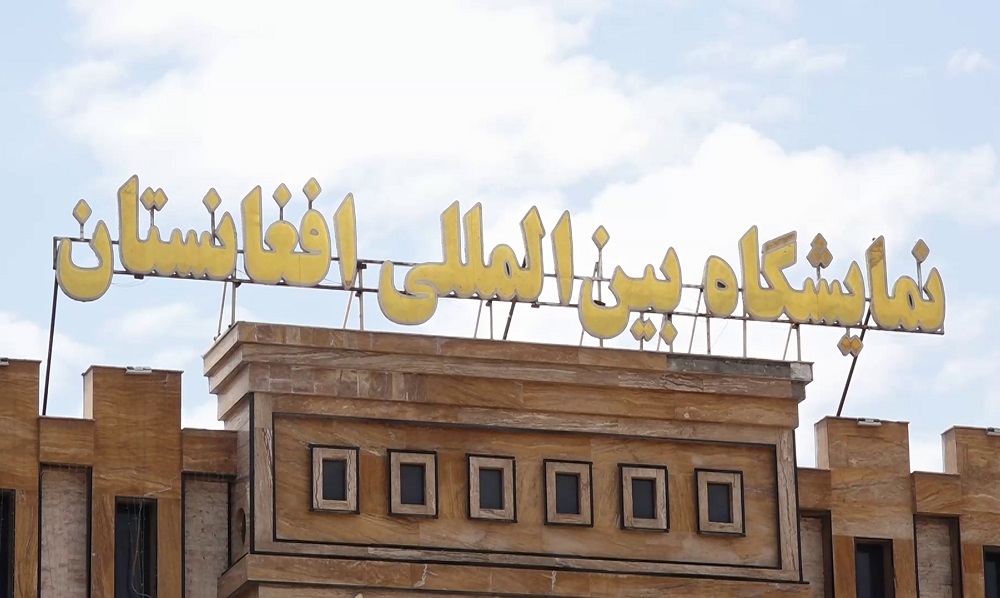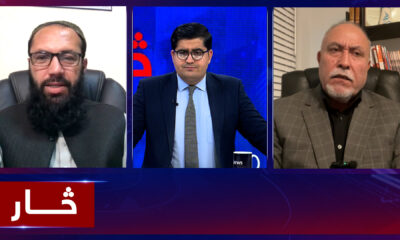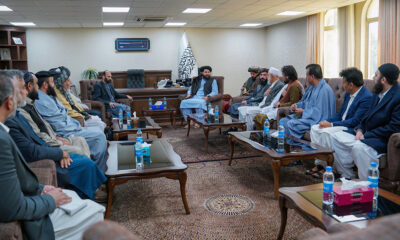Business
IEA ban use of foreign currency in Afghanistan

The Islamic Emirate of Afghanistan [IEA] announced a complete ban on the use of foreign currency in Afghanistan on Tuesday, a move sure to cause further disruption to an economy pushed to the brink of collapse by the abrupt withdrawal of international support, Reuters reported.
The surprise move came hours after at least 25 people were killed and more than 50 wounded when gunmen attacked Afghanistan’s biggest military hospital after two heavy explosions at the site in central Kabul.
“The economic situation and national interests in the country require that all Afghans use Afghan currency in their every trade,” the IEA said in a statement shared with journalists by their deputy minister Zabiullah Mujahid.
The use of U.S. dollars is widespread in Afghanistan’s markets, while border areas use the currency of neighbouring countries such as Pakistan for trade.
The IEA government is pressing for the release of billions of dollars of central bank reserves as the drought-stricken nation faces a cash crunch, mass starvation and a new migration crisis.
Afghanistan parked billions of dollars in assets overseas with the U.S. Federal Reserve and other central banks in Europe, but that money has been frozen since the IEA ousted the Western-backed government in August.
The departure of U.S.-led forces and many international donors left the country without grants that financed three quarters of public spending.
The finance ministry said it had a daily tax take of roughly 400 million Afghanis ($4.4 million).
Although Western powers want to avert a humanitarian disaster in Afghanistan, they have refused to officially recognise the IEA government.
* We Give So They May Live Campaign – Donate Here: www.helpafg.org
Ariana News and Ariana Television fully support the Bayat Foundation’s initiative to raise funds to provide emergency aid to poverty-stricken Afghans. As official media partners we appeal to you to help provide food essentials to as many Afghan families as possible.
Business
Afghanistan starts exporting via railway to Turkey

The Ministry of Interior says that Afghanistan has started exporting goods to Turkey via the Herat-Khaf railway line.
In a post on X, the ministry said: “Afghanistan’s exports to Turkey started in a calm atmosphere through the Herat-Khaf railway line.”
The ministry added that one train will run daily for a month and then two trains will run daily.
According to the ministry, the security of Khaf-Herat railway line is provided by the guards of the National Public Protection Agency.
Khaf-Herat railway project not only connects Iran and Afghanistan by rail, but also completes a 2,000-kilometer route along the east-west rail corridor from China, through Uzbekistan, to Afghanistan, to Iran, and on to Turkey and Europe.
As a landlocked country, this railway network will provide a safe route to connect with Europe via Iran’s railway network and Iran’s southern ports.
This railway line is strategic for trade between Iran and Afghanistan and will allow six million tons of goods to be sent between the two countries.
Business
Afghanistan, Kazakhstan to hold joint expo in Kabul

A joint expo between Afghanistan and Kazakhstan will be held in Kabul in the next four days, officials said on Sunday.
Officials of the Ministry of Industry and Commerce said that the two-day expo will be held for the purpose of expanding and strengthening trade relations between the two countries.
“This expo will be held as a follow-up of the Kazakh-Afghan international expo, which was held in the city of Astana, Kazakhstan, with the participation of a large delegation of the government and the private sector of the Islamic Emirate of Afghanistan,” Abdulsalam Javad Akhundzadeh, the spokesman of the Ministry of Industry and Commerce, said.
“At this expo, domestic products from different sectors of Afghanistan and the Republic of Kazakhstan will be put on display for two days.”
According to officials, 40 large Kazakh companies, and 40 large Afghan companies will exhibit their products.
Mohammad Saber Latifi, head of the Afghanistan International Expo Center, said that fruits, minerals and commercial services will be displayed at the expo.
During the expo, various memorandums of understanding for the trade of goods are also expected to be signed by companies.
Business
Afghanistan’s economic prospects are bleak: World Bank

The absence of GDP growth coupled with declining external financing avenues for off-budget expenditures paint a bleak picture of Afghanistan’s economic prospects, the World Bank said.
After a severe 20.7 percent GDP contraction in 2021, the Afghan economy contracted further by 6.2 percent in 2022, the bank said in a report.
“While Afghanistan’s agricultural and subsistence economy, including illicit opium production, provided some resilience in rural areas, higher prices, reduced demand, lower employment, and disruptions to services had severe impacts across the country,” it said.
The proportion of households that did not have enough income to meet basic food needs more than doubled from 16 percent to 36 percent in this period, according to the bank.
In the context of deep concerns about the policies of the Islamic Emirate of Afghanistan (IEA), including restrictions imposed on women and girls, the international community, including the World Bank, recalibrated its approach to supporting Afghanistan: first to providing humanitarian support and then to providing off-budget support for basic service delivery and livelihoods.
However, IEA moved to restore domestic revenues, which reached $2.2 billion or 15 percent of GDP in 2022. “Nevertheless, overall economic activity remained depressed, unemployment stayed high, and the banking sector was dysfunctional due to constraints on international transfers and concerns about liquidity and solvency.”
World Bank said that Afghanistan’s economic outlook remains uncertain, with the threat of stagnation looming large until at least 2025. “This economic stagnation will deepen poverty and unemployment, with job opportunities expected to decrease and food insecurity expected to increase.”
The bank noted that for a sustainable future, Afghanistan needs to focus on its comparative advantages, particularly in the agricultural and extractive sectors. Agriculture could be a key driver of growth and poverty reduction, with the potential to create jobs, it added.
-

 Sport5 days ago
Sport5 days agoRashid Khan threatens BBL pullout after Australia postpones Afghanistan T20I series
-

 Business5 days ago
Business5 days agoCommerce ministry inks 10 MoUs to boost development of small and medium-sized businesses
-

 Sport4 days ago
Sport4 days agoAfghanistan Champions League kicks off with grand opening ceremony
-

 Latest News3 days ago
Latest News3 days agoPakistan’s frontiers minister stresses ‘dignified’ return of Afghan refugees
-

 Regional4 days ago
Regional4 days agoIran’s foreign minister downplays drone attack, says Tehran investigating
-

 Latest News5 days ago
Latest News5 days agoTen people killed by floods in Helmand
-

 Business4 days ago
Business4 days agoAfghanistan’s economic prospects are bleak: World Bank
-

 Latest News4 days ago
Latest News4 days agoMore than 800 Afghan refugees deported from Pakistan in two days






















